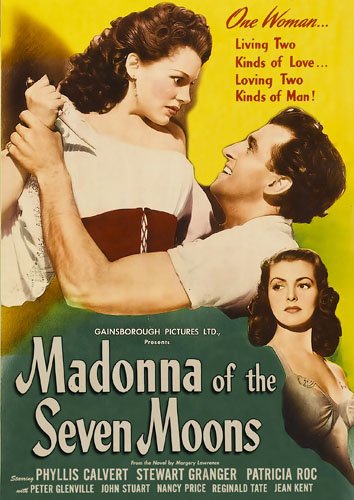
MADONNA OF THE SEVEN MOONS
UK, 1945, 110 minutes, Black and white.
Phyllis Calvert, Stewart Granger, Patricia Roc, Jean Kent, Dulcie Gray, Peter Glenville, Robert Speight.
Directed by Arthur Crabtree.
Madonna of the Seven Moons was one of the popular Gainsborough films of the mid 40s. With such films as The Man in Grey, Fanny by Gaslights, The Wicked Lady, Gainsborough studios provided lavish costume melodramas for war-time audiences.
The stars were regulars: Phyllis Calvert, Margaret Lockwood, James Mason, Stewart Granger, Patricia Roc. Many of these films were ridiculed by the critics at the time but have acquired a real reputation. However, they are highly melodramatic, purple passages film-making and often over the top. They offer interesting comment on British sensibilities at the time especially in comparison with those in the U.S. concerning relationships and sexuality. The British films are far franker and deal with the darker side of human behaviour.
This film is set in England and Italy, exotic locations for a story of split personality. Phyllis Calvert enjoys the opportunity to be both saintly and wild as the Italian girl who is raped by a gypsy and repressing it, becomes a good wife but escapes from her home to the gypsy world. Peter Glenville (director of such films as The Prisoner, The Comedians, Becket) appears as Stewart Granger's brother. British stage actor Robert Speight (the original for A Man for all Seasons) is Fr Carey.
1. The reputation of Gainsborough studios and their black and white melodramas in the 40s?
2. Influence on British film making? photography, studio sets, the atmosphere of Italy? The world of wealth, the gypsy world? The music?
3. The title and its exotic tones? Schizophrenia, split personality? Allegedly based on a true story? medical treatment of schizophrenia at the period? Popular conceptions - used for melodramatic plot?
4. Phyllis Calvert as Maddalena: the school girl in the convent, with the students, the nuns, the experience in the woods, the rape, the gypsy? Isolated? Repressing the experience? The passing of the years? Her 19th century demure style? Bringing up her daughter Angela? The present and Angela’s arriving? Evelyn, her friends? Maddalena and her relationship with her husband? The revelation of her disappearances? The change, the jewellery, the sign of the seven moons? Her going to the gypsies, the relationship with Sandro? With Nino? Her life with the gypsies, taunting Nino, Victoria and her jealousy? The jewellery? The search for her, Sandro's help? Angela looking for her mother? The mistaking of Sandro for Nino? Her killing him? The knife? Her own wounds? Her being taken home, the peacefulness of her death? her illness and the two sides of personality, the shadow?
5. Maddalena’s husband, his age, love for his wife? Doctor Acoroid and his concern? The mystery of her disappearances? Keeping it quiet? The search, the discovery of the truth, the doctor and his concern? The finale and Maddalena receiving the sacramental rites of the church?
6. The world of the gypsies, Stewart Granger and his style as Nino? The way of life, the relationship with Victoria? Rosanna, her appearances and disappearances? The plan, the robberies? suspicions, the cross, the jewellery? the plan to murder her? His refraining - and understanding what had happened? His throwing the rose on the cross?
7. Sandro, his background, friendship with Angela? Their meetings, plans? In the world of the gypsies? Jealousies? Sandro and his being murdered?
8. The gypsies, the streets, the homes, the taverns? The mother and her hold over the sons? The sinister aspects of gypsy life heightened for melodrama? Victoria and her love for Nino, her jealousy?
9. The contrast with Angela as the modern young woman, compared with her mother? Her friendship? her concern, friendship with Sandro? The search for her mother and the finding of the truth?
10. The artists and their work? with the world of the gypsies?
11. The religious aura of the film: Maddalena and the convent and the nuns, innocence and purity, violation and rape? Repression? the role of the priest, Maddalena and her Catholic style? The last rites?
12. The psychological and melodramatic plausibility of the film? Entertaining?